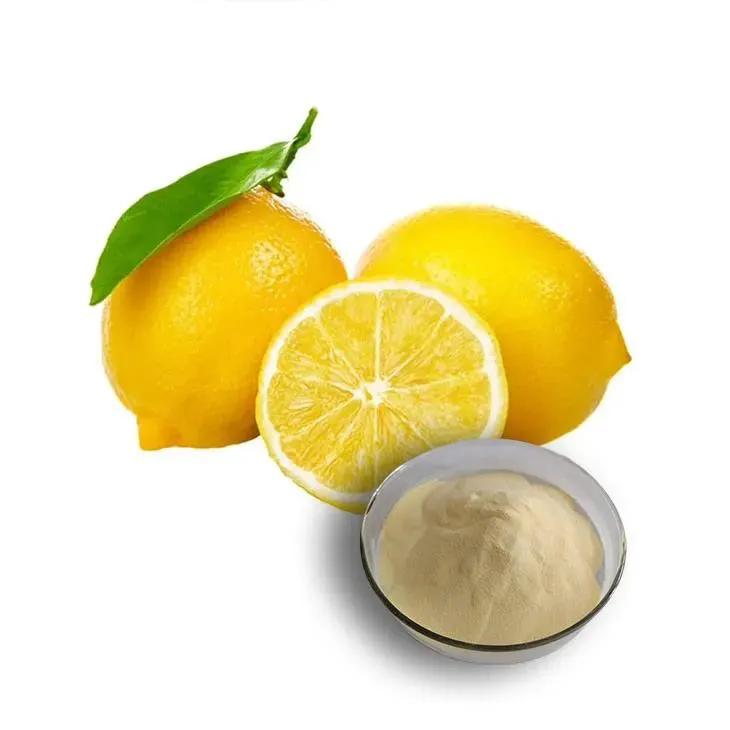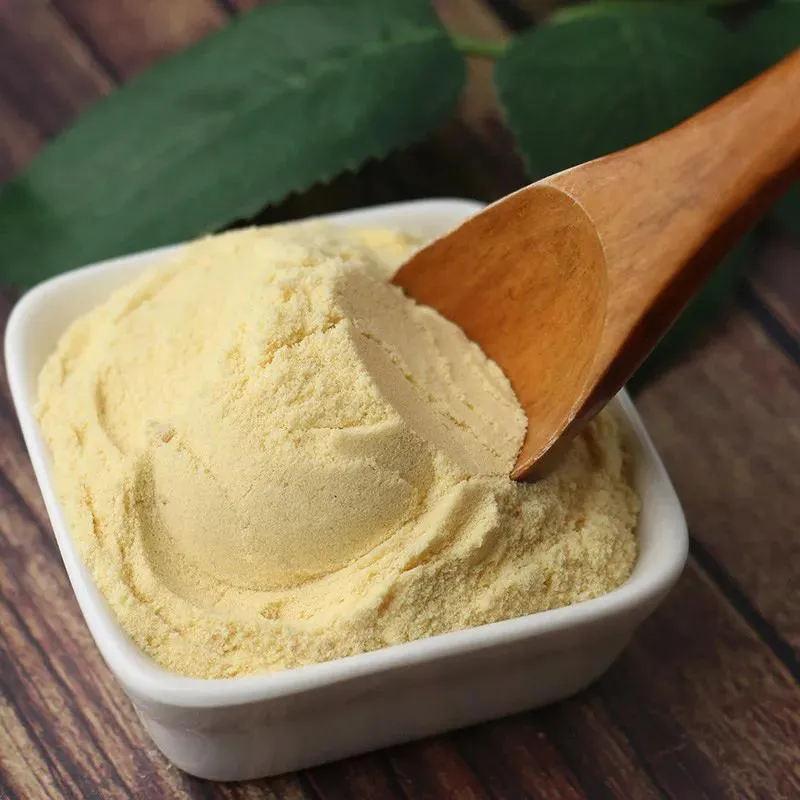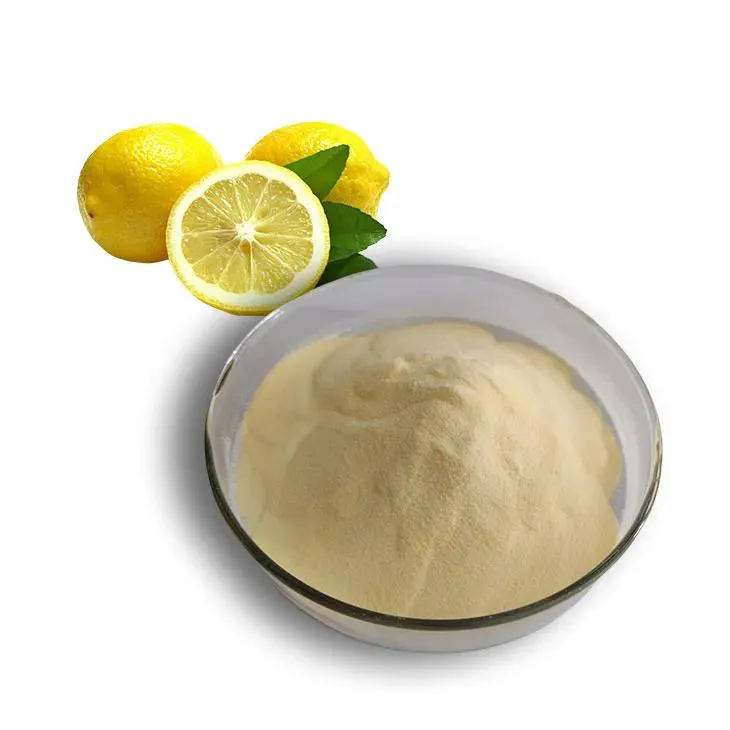- 0086-571-85302990
- sales@greenskybio.com
Is lemon juice powder good for diabetes? Are these all safe and suitable for diabetic patients?
2024-11-12

1. Introduction
Diabetes is a chronic metabolic disorder that affects millions of people worldwide. Management of diabetes involves a combination of lifestyle changes, including diet, exercise, and in some cases, medication. In recent years, there has been an increasing interest in the potential benefits of natural products, such as Lemon Juice Powder, for diabetes. Lemon juice is known for its high vitamin C content and acidic properties. But when it comes to its powdered form, its impact on diabetes needs a more in - depth exploration.

2. Nutritional Composition of Lemon Juice Powder
Lemon Juice Powder is made by dehydrating fresh lemon juice. It retains many of the nutrients present in fresh lemons.
2.1 Vitamins
It is rich in vitamin C, which is an antioxidant. Vitamin C helps in protecting cells from damage caused by free radicals. It may also play a role in improving the immune system, which is important for diabetic patients as they are more prone to infections. Additionally, some studies suggest that vitamin C may have a positive impact on blood vessel health, which can be beneficial for those with diabetes - related vascular complications.
2.2 Minerals
Lemon juice powder contains minerals such as potassium. Potassium is essential for maintaining proper heart function and for regulating fluid balance in the body. Diabetic patients are at risk of developing heart problems and proper potassium levels can contribute to heart health. However, it should be noted that for patients with kidney problems, excessive potassium intake may be a concern, so they need to be cautious.

3. Potential Benefits of Lemon Juice Powder for Diabetes
Lemon juice powder may offer several potential benefits for diabetic patients.
3.1 Blood Sugar Regulation
Some research indicates that the compounds in lemons may help in regulating blood sugar levels. Although the exact mechanism is not fully understood, it is believed that certain flavonoids and polyphenols present in lemon juice powder may improve insulin sensitivity. Insulin sensitivity is crucial for diabetic patients as it allows the body to use insulin more effectively to regulate blood glucose. For example, a study on animals showed that lemon - derived compounds could reduce blood sugar levels. However, more human - based studies are needed to confirm this effect in diabetic patients.
3.2 Weight Management
Weight management is an important aspect of diabetes control. Lemon juice powder can be a useful addition to a weight - loss or weight - maintenance plan. It is low in calories and can add flavor to water or other beverages, making it a healthy alternative to high - calorie drinks. Drinking lemon - flavored water can also help increase feelings of fullness, which may lead to reduced calorie intake. Moreover, the citric acid in lemon juice powder may have a mild effect on increasing metabolism, although the effect is relatively small.
3.3 Antioxidant Effects
As mentioned earlier, the high vitamin C content in lemon juice powder provides antioxidant protection. Diabetic patients often have increased oxidative stress due to high blood sugar levels. Antioxidants can help counteract this oxidative stress by neutralizing free radicals. By reducing oxidative stress, it may be possible to slow down the progression of diabetes - related complications, such as nerve damage and eye problems.

4. Safety Considerations for Diabetic Patients
While lemon juice powder may have potential benefits, there are also some safety considerations for diabetic patients.
4.1 Acidic Nature
Lemon juice powder is acidic. Excessive consumption of acidic substances can potentially harm the teeth enamel. Diabetic patients should be aware of this and take appropriate measures such as drinking lemon - flavored beverages through a straw to minimize contact with teeth, or rinsing the mouth with water after consumption. Also, for those with pre - existing stomach or esophageal problems, the acidity may exacerbate their symptoms, so they need to be cautious.
4.2 Interaction with Medications
Some diabetic medications may interact with the compounds in lemon juice powder. For example, if a patient is taking medications to lower blood sugar, the combined effect of the medication and lemon juice powder may cause blood sugar to drop too low (hypoglycemia). It is essential for diabetic patients to consult their healthcare provider before adding lemon juice powder to their diet, especially if they are on multiple medications.
4.3 Kidney Function
As mentioned earlier regarding potassium content, patients with impaired kidney function need to be careful with their intake of lemon juice powder. The kidneys play a crucial role in filtering and excreting substances from the body. If the kidneys are not functioning properly, excessive potassium or other substances in lemon juice powder may build up in the body, leading to potential health problems.

5. How to Incorporate Lemon Juice Powder into a Diabetic Diet
If a diabetic patient decides to include lemon juice powder in their diet, it should be done in a proper and controlled manner.
5.1 Beverages
One of the simplest ways is to add lemon juice powder to water to make a refreshing and low - calorie drink. It can also be added to unsweetened herbal teas for added flavor. However, it is important to avoid adding excessive amounts of sugar or artificial sweeteners, as this can negate the potential benefits for diabetes control.
5.2 Cooking and Food Preparation
Lemon juice powder can be used in cooking and food preparation. For example, it can be added to salad dressings in place of fresh lemon juice. It can also be used in marinades for meats or fish. When using it in cooking, it is important to consider the overall nutritional balance of the meal and ensure that the addition of lemon juice powder does not increase the calorie or sodium content significantly.
6. Conclusion
In conclusion, lemon juice powder may offer some potential benefits for diabetic patients, such as blood sugar regulation, weight management, and antioxidant effects. However, there are also safety considerations, including its acidic nature, potential interactions with medications, and concerns for patients with kidney problems. Diabetic patients should consult their healthcare providers before incorporating lemon juice powder into their diet. With proper guidance and moderation, lemon juice powder may be a useful addition to a diabetic - friendly diet, but it is not a substitute for medical treatment and a comprehensive diabetes management plan.
FAQ:
Q1: What are the main components in lemon juice powder?
Lemon juice powder contains various components. It has citric acid which gives it the characteristic sour taste. It also contains vitamins such as vitamin C, some minerals like potassium, and small amounts of flavonoids. These components may play different roles in relation to diabetes.
Q2: How could lemon juice powder potentially affect blood sugar levels?
Lemon juice powder may have a positive impact on blood sugar levels. Citric acid in it might help improve insulin sensitivity, which is beneficial for diabetic patients as it allows the body to use insulin more effectively. However, it is not a substitute for diabetes medications but could be a complementary addition to a diabetes - friendly diet.
Q3: Is lemon juice powder safe for diabetic patients in terms of kidney function?
For most diabetic patients, lemon juice powder is generally safe in relation to kidney function. The potassium content in it is usually within a reasonable range for normal kidney function. However, diabetic patients with existing kidney problems need to be cautious. If the kidneys are not functioning properly, excessive potassium intake from lemon juice powder could potentially be harmful, so it's advisable to consult a doctor.
Q4: Can lemon juice powder replace other diabetic - friendly foods?
No, lemon juice powder cannot replace other diabetic - friendly foods. While it may offer certain benefits, a balanced diet for diabetic patients should include a variety of foods such as whole grains, lean proteins, and other fruits and vegetables. Lemon juice powder can be part of a diverse diet but should not be the sole component.
Q5: Are there any side effects of lemon juice powder for diabetic patients?
For some diabetic patients, excessive consumption of lemon juice powder may cause digestive issues like acid reflux or stomach discomfort. Also, as mentioned before, if there are kidney problems, the potassium in it could be a concern. However, when consumed in moderation as part of a healthy diet, side effects are usually minimal.
Related literature
- The Role of Citrus Fruits in Diabetes Management"
- "Nutritional Components of Lemon and Their Impact on Health"
- "Dietary Supplements and Diabetes: A Comprehensive Review"
- ▶ Hesperidin
- ▶ citrus bioflavonoids
- ▶ plant extract
- ▶ lycopene
- ▶ Diosmin
- ▶ Grape seed extract
- ▶ Sea buckthorn Juice Powder
- ▶ Beetroot powder
- ▶ Hops Extract
- ▶ Artichoke Extract
- ▶ Reishi mushroom extract
- ▶ Astaxanthin
- ▶ Green Tea Extract
- ▶ Curcumin Extract
- ▶ Horse Chestnut Extract
- ▶ Other Problems
- ▶ Boswellia Serrata Extract
- ▶ Resveratrol Extract
- ▶ Marigold Extract
- ▶ Grape Leaf Extract
- ▶ blog3
- ▶ blog4
- ▶ blog5
-
Organic Tongkat Ali extract powder factory.
2024-11-12
-
How to make powder with ashwagandha extract.
2024-11-12
-
Rosehip extract manufacturers from China.
2024-11-12
-
The best cat's claw extract in nature.
2024-11-12
-
Chinese Dandelion Leaf Extract Suppliers.
2024-11-12
-
Feverfew Extract
2024-11-12
-
Yohimbine Bark Extract
2024-11-12
-
Ginger Extract
2024-11-12
-
Aguaje Extract
2024-11-12
-
Black Rice Extract
2024-11-12
-
Cassia Seed Extract
2024-11-12
-
Cocoa Extract
2024-11-12
-
Garcinia Cambogia Extract
2024-11-12
-
Curcumin
2024-11-12
-
Konjac Powder
2024-11-12





















